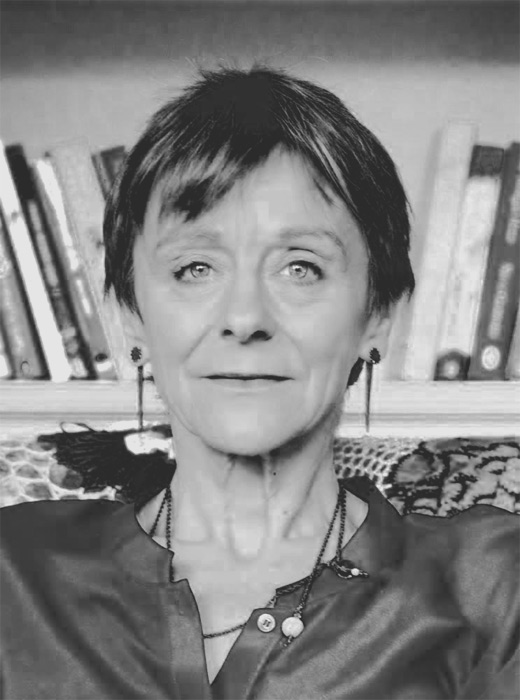Posted on March 7, 2016 by The Orwell Prize -

In The New Threat renowned expert and prize-winning reporter Jason Burke provides the clearest and most comprehensive guide to Islamic militancy today.
From Syria to Somalia, from Libya to Indonesia, from Yemen to the capitals of Europe, Islamic militancy appears stronger, more widespread and more threatening than ever. ISIS and other groups, such as Boko Haram, together command significant military power, rule millions and control extensive territories. Elsewhere Al-Qaeda remains potent and is rapidly evolving. Factions and subsidiaries proliferate worldwide, and a new generation of Western Jihadists are emerging, joining conflicts abroad and attacking at home. Who are these groups and what do they actually want? What connects them and how do they differ? How are we to understand their tactics of online activism and grotesque violence?
Drawing on almost two decades of frontline reporting as well as a vast range of sources, from intelligence officials to the militants themselves, renowned expert Jason Burke cuts through the mass of opinion and misinformation to explain dispassionately and with total clarity the nature of the threat we now face. He shows that Islamic militancy has changed dramatically in recent years. Far from being a ‘medieval’ throwback, it is modern, dynamic and resilient. Despite everything, it is entirely comprehensible.
The New Threat is essential reading if we are to understand our fears rather than succumb to them, to act rationally and effectively, and to address successfully one of the most urgent problems of our time.
Taken from and read more at Penguin.
Posted on March 7, 2016 by The Orwell Prize -

The Tears of the Rajasis a sweeping history of the British in India, seen through the experiences of a single Scottish family. For a century the Lows of Clatto survived mutiny, siege, debt and disease, everywhere from the heat of Madras to the Afghan snows. They lived through the most appalling atrocities and retaliated with some of their own. Each of their lives, remarkable in itself, contributes to the story of the whole fragile and imperilled, often shockingly oppressive and devious but now and then heroic and poignant enterprise.
On the surface, John and Augusta Low and their relations may seem imperturbable, but in their letters and diaries they often reveal their loneliness and desperation and their doubts about what they are doing in India. The Lows are the family of the author’s grandmother, and a recurring theme of the book is his own discovery of them and of those parts of the history of the British in India which posterity has preferred to forget.
The book brings to life not only the most dramatic incidents of their careers – the massacre at Vellore, the conquest of Java, the deposition of the boy-king of Oudh, the disasters in Afghanistan, the Reliefs of Lucknow and Chitral – but also their personal ordeals: the bankruptcies in Scotland and Calcutta, the plagues and fevers, the deaths of children and deaths in childbirth. And it brings to life too the unrepeatable strangeness of their lives: the camps and the palaces they lived in, the balls and the flirtations in the hill stations, and the hot slow rides through the dust. An epic saga of love, war, intrigue and treachery, The Tears of the Rajas is surely destined to become a classic of its kind.
Taken from and read more at: Simon & Schuster.
Posted on March 2, 2016 by The Orwell Prize -

Shiraz Maher is a freelance journalist and a Senior Fellow at the International Centre for the Study of Radicalisation, King’s College London. @ShirazMaher
Submitted Articles
Posted on March 2, 2016 by The Orwell Prize -

Michael Buchanan’s investigation into Southern Health exposed the failure of one of England’s biggest mental health trusts to investigate the unexpected deaths of hundreds of mental health patients and people with learning disabilities. The items were the product of weeks of sensitive and challenging conversations with those affected – several people broke down as they recalled the poor care their son or daughter had received prior to their death; many told us they were astonished that we were interested in hearing their stories after their own often repeated efforts had been ignored by the trust, regulators and others. The investigation led to the Health Secretary being forced to come to the House of Commons to answer urgent questions, where he announced a nationwide inquiry into how the NHS as a whole investigates the deaths of people with learning disabilities. Michael says “The stories we uncovered as part of this extensive investigation have given a voice to some of society’s most vulnerable individuals – mental health patients, people with learning disabilities – and have made it harder for the NHS to ignore their concerns. The mid-Staffs scandal highlighted poor practices in acute care; the failings we exposed at Southern Health have shone a light on the problems within mental health trusts, with few deaths investigated and lessons rarely learned from previous incidents.”
Journalistic Writing
Video Content
- Investigation into NHS Failings – 09/12/2015, BBC 1 10 O’Clock News
Audio Content
Posted on March 2, 2016 by The Orwell Prize -

Louise Tickle is an education and social affairs journalist. @louisetickle
Submitted Articles
Posted on March 2, 2016 by The Orwell Prize -

This project was conceived, planned, led and written by David Cohen. However, the photography was a key part of the project. David worked exclusively with Matt Writtle, an experienced freelance photographer who has often partnered him on his Evening Standard special projects, and Kiran Mensah, who he recruited from the Angell Town estate where Kiran had spent much of his youth. Kiran is a freelance photographer who had studied photography at university but had never been published in the mainstream press until he joined the team. The three of them formed a close-knit team that spent many months on the estate.
Journalistic Writing
Photojournalism
Social Media Content
Posted on March 2, 2016 by The Orwell Prize -

Oliver Bullough is a journalist and the author of two books about Russian history and politics: The Last Man in Russia, and Let Our Fame Be Great which was shortlisted for the Orwell Prize for Books in 2011. @oliverbullough
Submitted Articles
Posted on March 2, 2016 by The Orwell Prize -

Journalistic Writing
Video Content
Posted on March 2, 2016 by The Orwell Prize -

Gideon Rachman became chief foreign affairs columnist for the Financial Times in July 2006. He joined the FT after a 15-year career at The Economist, which included spells as a foreign correspondent in Brussels, Washington and Bangkok. He also edited The Economist’s business and Asia sections. His particular interests include American foreign policy, the European Union and globalisation.
@gideonrachman
Submitted Articles
Posted on March 2, 2016 by The Orwell Prize -

In an exclusive and groud-breaking investigation spanning more than six months, Channel 4 News was the first news organisation to successfully go undercover inside Britain’s most notorious immigration detention centre. Yarl’s Wood IRC in Bedfordshire holds up to 400 detainees, the vast majority are women facing deportation from the UK. For years, the centre, run by the security giant Serco, has been at the centre of claims of mistreatment of detainees. But despite multiple attempts, journalists had never succeeded in getting in. A micro-camera kit was specially constructed to avoid detection from the considerable security measures in place. A team from Channel 4 News was close by at all times. The investigation uncovered:
- Racist and sexist and dismissive behaviour by some members of staff
- Detention of highly vulnerable people including the elderly and pregnant
- Appalling treatment of pregnant women including one who suffered a miscarriage
- A “culture of disbelief” among staff towards detainees with health issues
- Many incidents of self-harming by detainees
- Issue of male officers intruding on women detainees
- Forced removals, including splitting a pregnant woman from her husband
- Issue of indefinite detention, including one woman who had been at YW for 3 years
- Worrying use of solitary confinement, restraint and violence against detainees
The impact of the investigation was swift and widespread in parliament and the media. Serco immediately launched an independent investigation, led by the eminent lawyer Kate Lampard, who had previously led an inquiry into Jimmy Saville. There was an angry debate in the House of Commons, with MPs of all parties condemning the conditions exposed by Channel 4 News. The Home Secretary Theresa May was accused of allowing the “state-sanctioned abuse of women.” The Home Office said the issues raised in the report would be looked at by David Shaw, in a review of welfare in detention commissioned by the Home Office. As a result of the Channel 4 News revelations HM Prison Inspectorate sent inspectors into Yarl’s Wood in April for an extended period. Their damning report in August 2015 described Yarl’s Wood a “place of national concern”. It highlighted the plight of 99 pregnant women held at the centre and poor healthcare provision. It said Yarl’s Wood was “failing to meet the needs of the most vulnerable women held.” In January 2016, David Shaw’s report into welfare in detention was published. It called for an “absolute exclusion” of detention for pregnant women, an end to detention of the vulnerable including the elderly and called for the government to bring an end to indefinite detention altogether. It called for big improvements to the healthcare provision and an end to the “culture of disbelief” among staff towards detainees with medical and mental health issues. It also said searches of women and women’s rooms should only be undertaken “in the most extreme and pressing circumstances.” At the same time, Kate Lampard published her report which was a direct response to our investigation. Her report said management, staffing levels and training at YW needed to be dramatically improved. It highlighted “serious concerns with staffing arrangements” and concluded there had been “serious incidents of inappropriate behaviour and individual cases of mistreatment and abuse of residents by staff.” She also found that there were weaknesses in the safeguarding of vulnerable detainees and urged Serco to address the problem. As a result of the investigation, 6 detention officers were suspended. Two were dismissed, and one resigned before the investigation took place. All staff at Yarl’s Wood were issued with body cameras to record and prevent abuse, and stair wells were boxed in to stop detainees from self-harming.
Journalistic Writing
Video Content
Posted on March 2, 2016 by The Orwell Prize -

Iona Craig is a freelance journalist. In 2015, she was recognized for her work as a Yemen correspondent at The Times of London, for which she was the recipient of the 2014 Martha Gellhorn prize.
@ionacraig
Submitted Articles
Posted on March 2, 2016 by The Orwell Prize -

We set out to move beyond the emotional claim and counter-claim which has characterised the debate over the impact of government spending cuts. To do this, we carried out an extensive, and ground-breaking, analysis of data from every local authority to measure the effect of the reductions on people’s lives. We discovered how many fewer elderly people were being looked after by social services, how many more homeless children were being accommodated in B&Bs and how much less was being spent on each child at risk of abuse and neglect. To fill what we regarded as a serious gap in public understanding, we then created an interactive feature which automatically detects where the reader is, presenting a personalised snapshot of the story and allowing him or her to discover what has happened to services in their localities over the past five years.
Journalistic Writing
Social Media Content
Posted on March 2, 2016 by The Orwell Prize -

Nicci Gerrard is a novelist and author of Soham: A Story Of Our Times. She also writes with her partner Sean French as Nicci French. With nearly one million Britons in the grip of dementia, it’s hardly surprising that writers and artists should increasingly tackle the subject. But can the arts ever illuminate a condition that by its very nature resists all understanding?
@FrenchNicci
Submitted articles
Posted on March 2, 2016 by The Orwell Prize -

David Gardner is International Affairs Editor at the Financial Times.
Submitted Articles
Posted on April 24, 2015 by The Orwell Prize -

This year, George Arbuthnott has spearheaded a series of hard-hitting campaigns and public interest exposés that have forced the government into change.
His campaign to highlight modern slavery in Britain has continued apace. In January, he revealed migrants in the UK’s fishing fleet were being systematically exploited and in the spring he disclosed Eastern European slaves had been forced to work on £2 a day at a bed factory in northern England supplying two of Britain’s biggest retailers. The firm’s owner later became the first UK boss to be charged with human trafficking. Arbuthnott then informed the Home Office the ancestor of the abolitionist William Wilberforce said his forefather would be saddened by its persistent refusal to act and, a day later, the government announced big business would indeed be forced to publicly report on its anti-slavery efforts.
Journalistic Writing
Slaves in peril on the sea – 1/19/2014, The Sunday Times Magazine
Video
Slaves in peril on the sea – 1/19/2014, Sunday Times multimedia team production
Posted on April 24, 2015 by The Orwell Prize -

Last year marked the point at which London’s housing crisis went from dinner-party grumble to national front-page news. Luxury flats were snapped up for millions by the super-rich, while entire communities faced the prospect of being shunted out of their homes. This was a story that Aditya Chakrabortty made his own, both reporting from the frontline of London’s housing crisis and analysing its driving forces. His columns have often helped shape the wider debate: the enclosed piece on the Focus E15 Mothers sparked a storm of interest in Britain and around the world; while the article on New Era provoked widespread outrage, forcing the withdrawal just two days later of a party of investors. In his investigative reporting, Aditya brought out the harsh realities of ‘regeneration’ in a landmark piece of long reporting that took up most of a G2 supplement. He also went behind the scenes of a local council overwhelmed by its housing shortage and explored the radical measures it is making to improve things. This submission features polemics, long investigations, videos and data maps. Although Aditya drove each story, they were produced in collaboration with Sophie Robinson-Tillett, Phil Maynard, Guy Grandjean, George Arnett. Together, we believe they make a compelling candidate for the inaugural Orwell Prize for Exposing Britain’s Social Evils.
Journalistic Writing
The true cost of gentrification – 19/05/2014, The Guardian G2 Millionaire Tory MP and the tenants facing homelessness – 11/11/2014, The Guardian Yacht parties in Cannes – 14/10/2014, The Guardian Enfield Housing – 02/09/2014, The Guardian G2 For real politics, look to an empty London housing estate – 23/09/2014, The Guardian Nightmare of renting started in Westminster – 26/08/2014, The Guardian
Video
The true cost of gentrification – 18/05/2014, The Guardian Enfield Housing – 01/09/2014, The Guardian
Posted on April 24, 2015 by The Orwell Prize -

Alison has a long track record of reporting on the realities of life for some of the most vulnerable people in our society, using her detailed knowledge of social care to expose a system that is under pressure. In Undercover Elderly Care: Behind Closed Doors, a Panorama special broadcast in BBC1 prime time, Alison worked with producer Joe Plomin, undercover reporter Alex Lee and assistant producer Ceri Isfryn to put together a powerful programme showing the human cost of poor care. The programme led to a parliamentary debate, widespread national media coverage and the sacking of seven staff at an Essex care home. Social care experts say the programme helped shape the Care Quality Commission’s new inspection regime and describe it as ground-breaking for the way in which it charts the impact on individuals of day to day poor care. This is the third Panorama film on care that Alison has made with producer Joe Plomin in the past three years. The Hospital that Stopped Caring (October 2012) looked at the system failures that allowed abuse at Winterbourne View Hospital for people with learning disabilities and autism to go unchecked. Elderly Care: Condition Critical (June 2013) looked at increases in deaths in homes where poor care was suspected. All three of these films got extremely high audience appreciation ratings. In addition to reporting on what Behind Closed Doors uncovered for all main BBC radio and television news outlets, Alison continued to follow the different strands of the story for the BBC’s flagship TV news programmes at Six and Ten. Three care workers have since been arrested and charged at the Essex home and at another home, Orchid View, a serious case review spelt out the failings that had led to the deaths of some elderly residents. In the last year, Alison has also reported on the pressures faced by home care staff and the failure to move people with learning disabilities closer home. The stories included in this entry are just a selection of a wide range of stories Alison has done on the care of the elderly and vulnerable in the last year, among them reports on the impact of loneliness and worries over social care funding. It shows a continuing determination to ensure the voices of some of the most marginalised in society are heard.
Video
Audio
- Diary of a home care worker – BBC Radio 4, “PM”, 12/1/2014
- Essex care home sackings – BBC Radio 4, six o’clock news, 4/30/2014
Posted on April 24, 2015 by The Orwell Prize -

A Great British Housing Crisis exposes how developers, despite making record profits, reduce their affordable housing obligations at a time of intense need. This long-read was researched over a 12 month period. It uses innovative web technology to create what I hope you think is a well-crafted story of systemic social policy failure that blights the lives of hundreds of thousands of people in Britain today. The first half of the investigation ran on Vice News: http://bit.ly/1AiKVsj It also ran as a page lead in the Guardian: http://bit.ly/1AZvCZi The Guardian story prompted a full Guardian editorial three days later: http://bit.ly/1Bnlms4 The long-read was also referred to in an Observer editorial: http://bit.ly/1CaVKPi A Radio 4 File on Four has also been commissioned on the back of my work which will air after the election. The Labour party has indicated to the Bureau that if it gets into power it will fundamentally reform the viability system to make it more transparent as shown at the end of this Bureau story: http://bit.ly/1u9lkQp The Bureau also broadcast an engaging podcast hosted by BBC radio stalwart Owen Bennett-Jones which featured a housebuilder, a councillor who sits on a planning committee and Nick. The final written submission is a piece I wrote analysing the affordable housing delivery record of Britain’s most powerful landowners: the Crown Estate and the Duchy of Cornwall. These two historic estates have plans to build 4,300 homes in 31 schemes. The Bureau found over half the schemes being built by the Crown estate fail to meet local affordable housing targets. Prince Charles’ Duchy of Cornwall fared slightly better but by trawling through planning papers we found the Duchy had backtracked on affordable housing commitments in a number of cases. The story ran as a page lead in the Observer (submitted) The Bureau published a longer version which also examined the affordable delivery record of the Church Commissioners and the Duchy of Westminster.http://bit.ly/1nko1up Our full data analysis is here http://bit.ly/1oE3Eux I also wrote a piece asking why can’t the Crown estate become a social landlord? This ran on the Huffington Post http://huff.to/1daJsNt Members of the Treasury and DCLG Select Committees have subsequently expressed their intention to bring these issues directly to the attention of the Crown Estate.
Journalistic Writing
A Great British Housing Crisis – 12/15/2014, Bureau of Investigative Journalism Top 10 housebuilders to rake in £2.1bn in 2014 – 12/28/2014, The Guardian Royal estates ‘fail to meet targets to build affordable homes’ – 2/9/2014, The Observer
Audio
Britain’s Affordable Housing Crisis: The Inside Story – 12/15/2014, Soundcloud

















